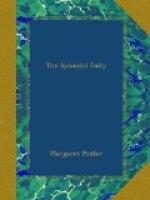“Some day, Diana, you’ll be sorry that you chucked one of the best chaps in the world,” he told her, with a fierce young championship that was rather touching, warring, as it did, with his honest affection for Diana herself. “Oh! It makes me sick! You two ought to have had such a splendid life together.”
Rather wistfully, Diana asked the Rector if he, too, blamed her entirely for what had occurred. But Alan Stair’s wide charity held no room for censure.
“My dear,” he told her, “I don’t think I want to blame either you or Max. The situation was difficult, and you weren’t quite strong enough to cope with it. That’s all. But”—with one of his rare smiles that flashed out like sunshine after rain—“you haven’t reached the end of the chapter yet.”
Diana shook her head.
“I think we have, Pobs. I, for one, shall never reopen the pages. My musical work is going to fill my life in future.”
Stair’s eyes twinkled with a quiet humour.
“Sponge cake is filling, my dear, very,” he responded. “But it’s not satisfying—like bread.”
Since Diana had left her husband, fate had so willed it that they had never chanced to meet. She had appeared very little in society, excusing herself on the plea that her professional engagements demanded all her energies. And certainly, since the immediate and overwhelming success which she had achieved at Covent Garden, her operatic work had made immense demands both upon her time and physical strength.
But, with the advent of autumn, the probabilities of a meeting between husband and wife were increased a hundredfold, since Diana’s engagements included a considerable number of private receptions in addition to her concert work, and she never sang at a big society crush without an inward apprehension that she might encounter Max amongst the guests.
She shrank from meeting him again as a wounded man shrinks from an accidental touch upon his hurt. It had been easy enough, in the first intolerant passion which had overwhelmed her, to contemplate life apart from him. Indeed, to leave him had seemed the only obvious course to save her from the daily flagellation of her love, the hourly insult to her dignity, that his relations with Adrienne de Gervais and the whole mystery which hung about his actions had engendered.
But when once the cord had been cut, and life in its actuality had to be faced apart from him, Diana found that love, hurt and buffeted though it may be, still remains love, a thing of flame and fire, its very essence a desire for the loved one’s presence.
Every fibre of her being cried aloud for Max, and there were times when the longing for the warm, human touch of his hand, for the sound of his voice, grew almost unbearable. Yet any meeting between them could be but a barren reminder of the past, revitalising the dull ache of longing into a quick and overmastering agony, and, realising this, Diana recoiled from the possibility with a fear almost bordering upon panic.




